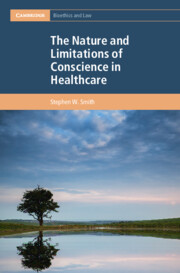Book contents
- The Nature and Limitations of Conscience in Healthcare
- Cambridge Bioethics and Law
- The Nature and Limitations of Conscience in Healthcare
- Copyright page
- Dedication
- Contents
- Table of Cases and Statutes
- Acknowledgements
- 1 Introduction
- 2 Conscience from First Principles
- 3 Respecting Conscience
- 4 Responsibilities of Conscience
- 5 Conscientious Provision and Objection
- 6 Complicity and Corporate Conscience
- 7 Regulating Claims of Conscience
- 8 Conclusion
- Bibliography
- Index
- Cambridge Studies in Bioethics and Health Law
6 - Complicity and Corporate Conscience
Published online by Cambridge University Press: 12 September 2025
- The Nature and Limitations of Conscience in Healthcare
- Cambridge Bioethics and Law
- The Nature and Limitations of Conscience in Healthcare
- Copyright page
- Dedication
- Contents
- Table of Cases and Statutes
- Acknowledgements
- 1 Introduction
- 2 Conscience from First Principles
- 3 Respecting Conscience
- 4 Responsibilities of Conscience
- 5 Conscientious Provision and Objection
- 6 Complicity and Corporate Conscience
- 7 Regulating Claims of Conscience
- 8 Conclusion
- Bibliography
- Index
- Cambridge Studies in Bioethics and Health Law
Summary
This sixth chapter explores issues surrounding collective acts of conscience. Specifically, it focuses on the issue of complicity as well as institutional conscience. Complicity in conscience is a frequent subject of discussion, as many conscience claims, such as referrals of treatment or supervision, rely on notions of complicity. However, complicity in conscience is significantly different from complicity in other areas of law and ethics, and there is insufficient exploration as to why. This chapter provides a firmer grounding for complicity. From there, the chapter moves to a discussion of institutional conscience. The chapter explores the reasons generally used in support of institutional conscience but argues that most do not survive scrutiny. Instead, it claims that institutional conscience does not provide any adequate protection for individual conscience and, instead, often overrides or limits it. It then provides reasons for an alternative view of how institutions ought to engage with conscience.
Information
- Type
- Chapter
- Information
- The Nature and Limitations of Conscience in Healthcare , pp. 110 - 151Publisher: Cambridge University PressPrint publication year: 2025
Accessibility standard: WCAG 2.2 AAA
Content Navigation
Allows you to navigate directly to chapters, sections, or non‐text items through a linked table of contents, reducing the need for extensive scrolling.
Provides an interactive index, letting you go straight to where a term or subject appears in the text without manual searching.
Reading Order & Textual Equivalents
You will encounter all content (including footnotes, captions, etc.) in a clear, sequential flow, making it easier to follow with assistive tools like screen readers.
Visual Accessibility
You will still understand key ideas or prompts without relying solely on colour, which is especially helpful if you have colour vision deficiencies.
You benefit from high‐contrast text, which improves legibility if you have low vision or if you are reading in less‐than‐ideal lighting conditions.
